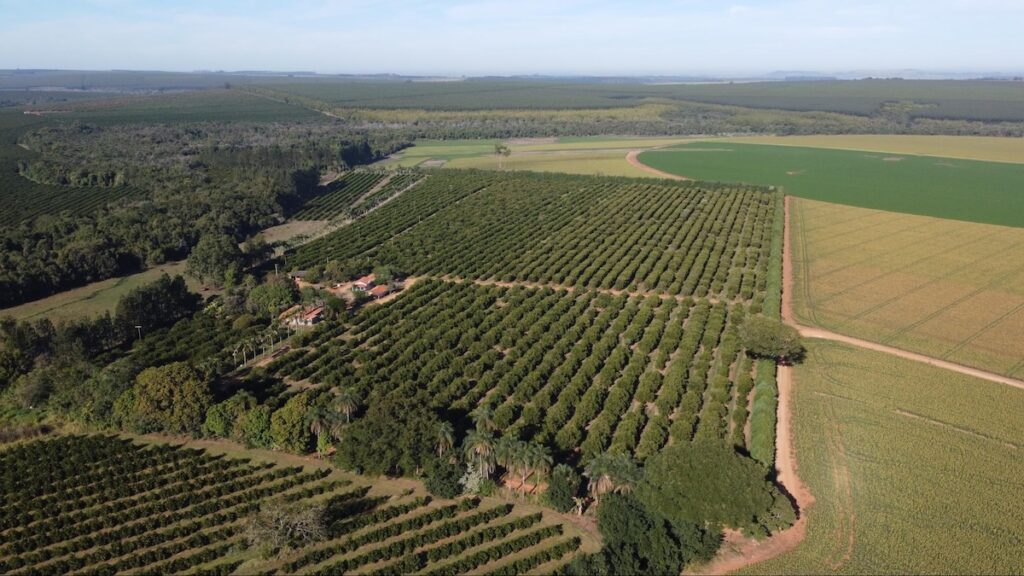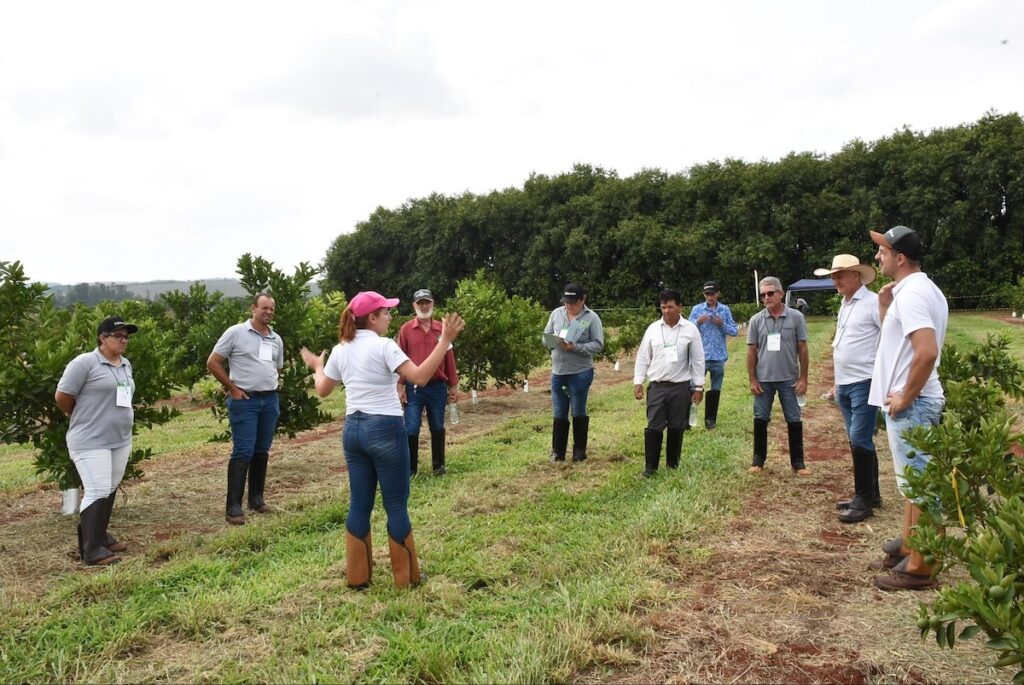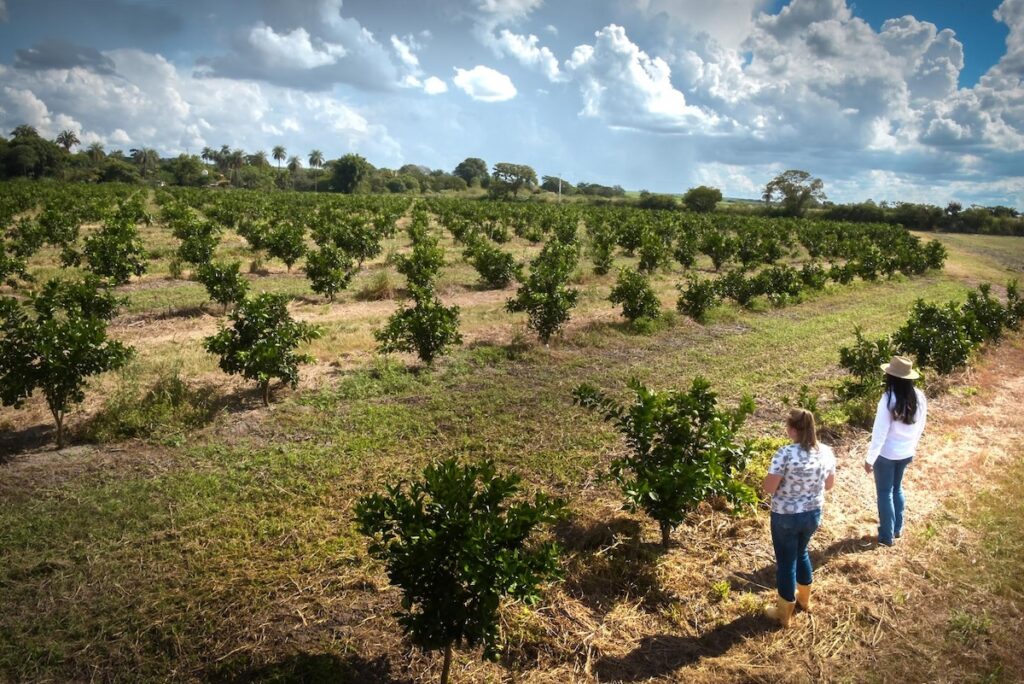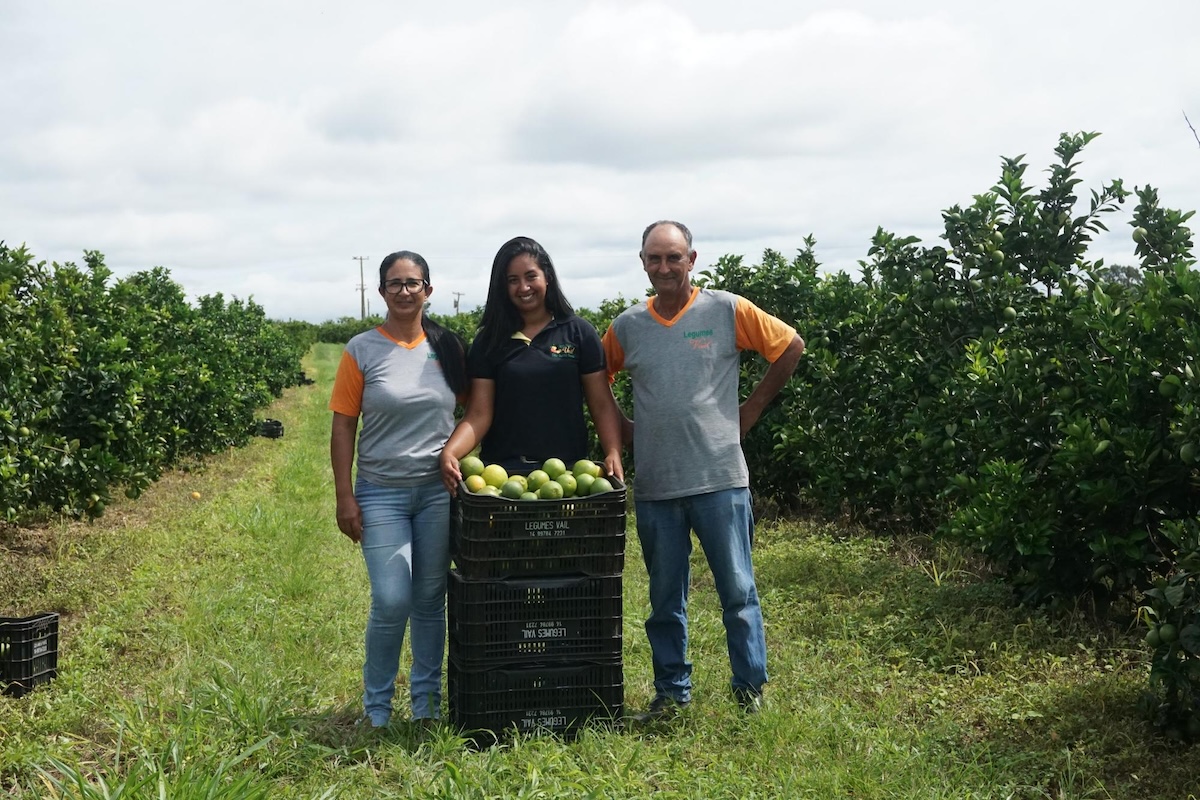Participant in the Fruto Resiliente programme, Giovana Lopes (center), is an agronomist leading orange cultivation on her family’s farm in Ubirajara, São Paulo. Photo: Solidaridad
Now in its fifth year, the project Fruto Resiliente: Strengthening Sustainable Orange Production in Brazil has supported nearly 500 citrus growers in adopting improved agricultural practices on their farms. With the successful completion of its first phase, which emphasized individualized and personalized technical assistance, the programme continues to promote compliance with the bronze level of the Farm Sustainability Assessment (FSA) by the Sustainable Agriculture Initiative (SAI) platform. It also aims to support practices aligned with new European regulations for citrus-growing home farmers. These efforts are being implemented by Solidaridad in collaboration with organizations from the food and beverage sector.

During the first phase, farmers received nearly 5,000 technical visits, adjusted over 3,400 practices, and brought 14,000 hectares under sustainable management. Of the practices adjusted, 39% focused on environmental aspects, agrochemicals’ correct use, and work support infrastructure; 37% aimed at improving working conditions; and 24% were related to cultivation and business practices. Additionally, farmers got support on water analysis to ensure quality and potability, as well as soil and leaf analysis. These services provided guidance on proper management and efficient use of inputs, while contributing to enhanced productivity. Moreover, encouraging sustainable practices improves environmental performance and helps citrus growers to meet evolving market demands.
“By applying the Fruto Resiliente protocol in the field, we are not only supporting adjustments to meet legal requirements, but also preparing citrus growers for the future of orange production, shaped by sustainability demands from the consumer market.”
Guilherme Ortega, Orange Programme Manager at Solidaridad in Brazil.
“Today, we have nearly 500 farmers participating in the project, spread across the entire Brazilian Citrus Belt. By applying the Fruto Resiliente protocol in the field, we are not only supporting adjustments to meet legal requirements, but also preparing citrus growers for the future of orange production, shaped by sustainability demands from the consumer market,” said Guilherme Ortega, Orange Programme Manager at Solidaridad in Brazil.
The project also supports farmers in improving practices that benefit farm workers, ensuring respect for decent working conditions and human rights. Training on health and safety, and proper hiring of workers directly and indirectly benefited more than 4,400 permanent and seasonal workers.
Some of the practices adopted to ensure better working conditions included:
- Proper working contracts,
- Regular use of personal protective equipment (PPEs),
- Mandatory training on handling of agrochemicals, and
- Building farm infrastructure to support workers’ health and safety.
One of the workers involved in the project shared the following testimonial: “…he [the farmer] built a small shed to store pesticides … . Then he put up shelves and organized the products neatly on them. When you go inside, you don’t get lost, you know exactly where to go to grab the product … . And we’ve got the PPE that helps a lot with protection, it turned out really well.”
A cornerstone of the Fruto Resiliente programme has been the dissemination of support content for the citrus sector. Ninety videos, seven booklets, and a field notebook were produced to assist growers with day-to-day management of their orchards. These materials, available both physically and online, logged over 2,000 downloads and online visits.
In-person engagement also fostered information exchange with more than 20 training sessions conducted over the past five years. For citrus grower Giovana Lopes, these networking opportunities have been valuable.
“We see enormous potential in citrus farming, but unfortunately, it’s not accessible to everyone. With Solidaridad’s support, we can achieve much more,” she shared. “For instance, we had a field day at the Sylvio Moreira Citriculture Center — this connection wouldn’t have been possible without Solidaridad.”

In 2023, two major milestones solidified the programme’s reputation as a benchmark for sustainability. At the 48th Expocitros, Solidaridad received the “Citriculture Center” prize, awarded by the Sylvio Moreira Citriculture Center to recognize contributions to the development and growth of the citrus sector. Additionally, the Fruto Resiliente criteria used to assess participating farms was benchmarked against the Sustainable Agriculture Initiative (SAI) FSA 3.0 bronze level. These accomplishments represent the programme’s success in achieving its objectives while aligning with globally recognized sustainability standards. Solidaridad’s Country Manager in Brazil, Rodrigo Castro, underscored the initiative’s significance and innovation.
“This is an award-winning programme, and the citrus sector sees it as a pioneering and high-quality sustainability initiative. Producers acknowledge the value, importance, and impact generated by Solidaridad. Our partners and investors also recognize this achievement. It’s a programme poised for continued success because it’s already firmly established,” he affirmed.
For the Orange Programme’s Field Coordinator, Daniella Macedo, the project’s success lies in the technical development of the farmers.
“We’ve heard from producers who say they are passionate about citrus farming, but were uncertain about continuing in the field. With the technical assistance, training, and knowledge we provide, they now feel more confident and committed to staying in business.”
Daniella Macedo, Orange Programme Field Coordinator
“We’ve heard from producers who say they are passionate about citrus farming, but were uncertain about continuing in the field. With the technical assistance, training, and knowledge we provide, they now feel more confident and committed to staying in business,” she explained.
One success story is citrus grower Marcelo Faria, who highlighted the transformative impact of the programme:
“We often find that we are not complying with the legislation due to a lack of information. The laws change, and that information doesn’t always reach us. Solidaridad, through its WhatsApp group with producers, is constantly posting updates and videos to keep us informed. The technical support has also been exceptional—our plants have developed better, our costs have gone down, and the health of the orchard has significantly improved,” he shared.


